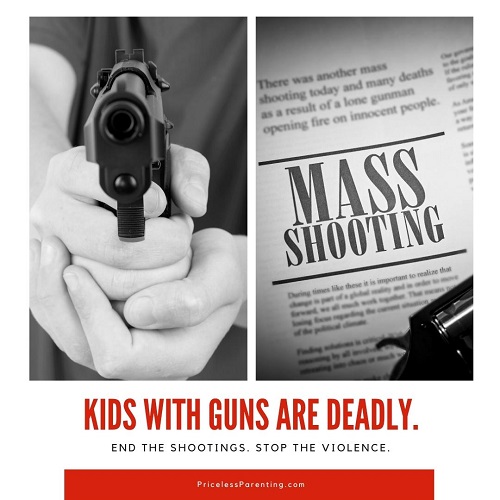Preventing Kids From Using Gun Violence
by Kathy Slattengren, M. Ed., Priceless Parenting (sign up for monthly parenting newsletter and receive 20+ printable charts for kids and parents)

You dream of your children growing up and making a positive impact on the world. The last thing you want is for your child to be responsible for killing innocent people. However, kids accidentally or intentionally shooting themselves or someone else is an everyday occurrence in the United States.
Reducing these tragedies requires commitment from everyone. Politicians need to pass common sense gun laws. Parents need to lock up their guns so that their kids cannot access them. Kids need to learn that violence is unacceptable.
Children should be safe in all public situations. It's beyond time for sensible gun laws including banning assault rifles. This is a societal problem that you cannot solve alone. However, you can influence your own children to not turn to violence as a way of dealing with their wounded feelings.
Removing Gun Access
If you have guns in your home, they should be stored in a safe or lock box, unloaded. Telling your kids not to touch your guns is not a solution.
Several curious kids under age 5 shoot and kill every year.
Guns are now the leading cause of death for kids in the United States.
If your child is going to a friend's house, make sure to ask the parents if they have guns and how they are stored.
Got boys with problems? Got guns? This is a dangerous combination. Most kids who shoot someone get their guns from their families or relatives. If your child takes your gun and uses it to kill someone, you may be legally held responsible. Even if that doesn't happen, you have a moral responsibility to protect innocent lives.
The
Violence Project analyzed 134 school shootings or attempted shootings. They found that over 95% of the shooters were male. The average age was 18-years-old. 91% were a current or former student at that school. In half the shootings, the shooter specifically targeted someone.
The more highly planned the event was the more people were killed. Surprisingly if there was an armed officer at the school, the rate of deaths was 2.83 times greater. More guns at schools are clearly not the solution.
Spotting Warning Signs
Being aware of the warning signs gives you an opportunity to get help before a tragedy occurs. Most kids who turn to violence are in crisis. They may recently have broken up with a girlfriend. They may be feeling suicidal. They may be wanting revenge.
Pay attention to
red flag behaviors that indicate your child is not coping well.
If your child is talking about killing others or themselves, it's time to get some professional help. Do not ignore this as an idle threat. You can ask your child directly if they are thinking about harming themselves or someone else. Asking the question can provide important information. It will not be giving them a new idea.
When you realize your child is emotionally unstable, protect your child from accessing guns. Do not buy your child a gun like James and Jennifer Crumbley did for their 15-year-old son, Ethan.
The article,
Behind the Charges Faced by the Parents of the Michigan Shooting Suspect, states "Karen D. McDonald, the Oakland County prosecutor, laid out those and other chilling details as she took the rare step of filing involuntary manslaughter charges against the suspect's parents, James and Jennifer Crumbley.
Ms. McDonald said the Crumbleys were culpable in the year's deadliest school shooting because they had allowed their son access to a handgun while ignoring glaring warnings that he was on the brink of violence."
What warning signs did they miss for Ethan? They were alerted to violent images he had drawn hours before the shooting. They were called to the school that morning due to a teacher finding an alarming note Ethan wrote containing, "Blood everywhere. The thoughts won't stop. Help Me." They did not remove Ethan from school that morning or let the school know he owns a gun and may have it with him.
Supporting Healthy Masculinity
Teens are trying to fit in with their peers. They are differentiating themselves from their parents and trying to figure out their place in the world. They tend to live in the moment and have difficulty anticipating when things may take a turn for the worse. While they may think they no longer need their parents' guidance, they do!
You can prepare your kids for successfully navigating this journey. Let them know that not all relationships work out. They are likely to feel rejected at some point. While being rejected feels bad, it is never an excuse for violence.
When your son is going through a difficult time, spend time just listening. Listening shows you care. Share with them some of the challenges you faced as a teen. Realizing there are common problems everyone faces can help your teens keep their problems in perspective.
Hold your kids accountable for their actions. It's important that they learn their choices and actions have consequences. Guide them to taking responsibility for their behavior rather than blaming others.
Teens want to feel significant. Turning to violence is not the way to do this. How does your child want to positively change the world? Guide them to
using their talents as a force for good. Accomplishing goals and developing skills builds confidence. They will be able be proud of their accomplishments and positive impact.
While media often portrays men's physical strength, it's inner strength that is needed for challenging times. Navigating through difficulties builds inner strength. Remind your kids of their qualities that have helped them through previous tough times. Help them realize they can handle difficult situations without turning to violence.